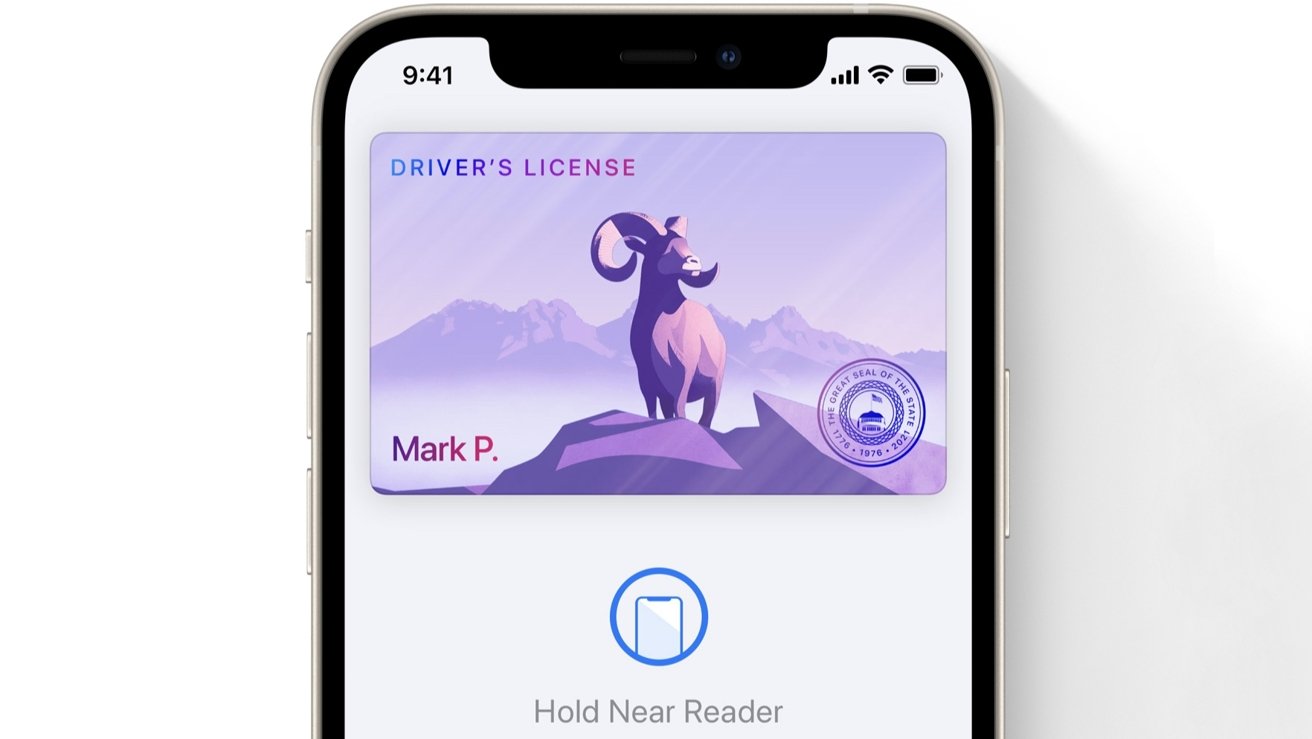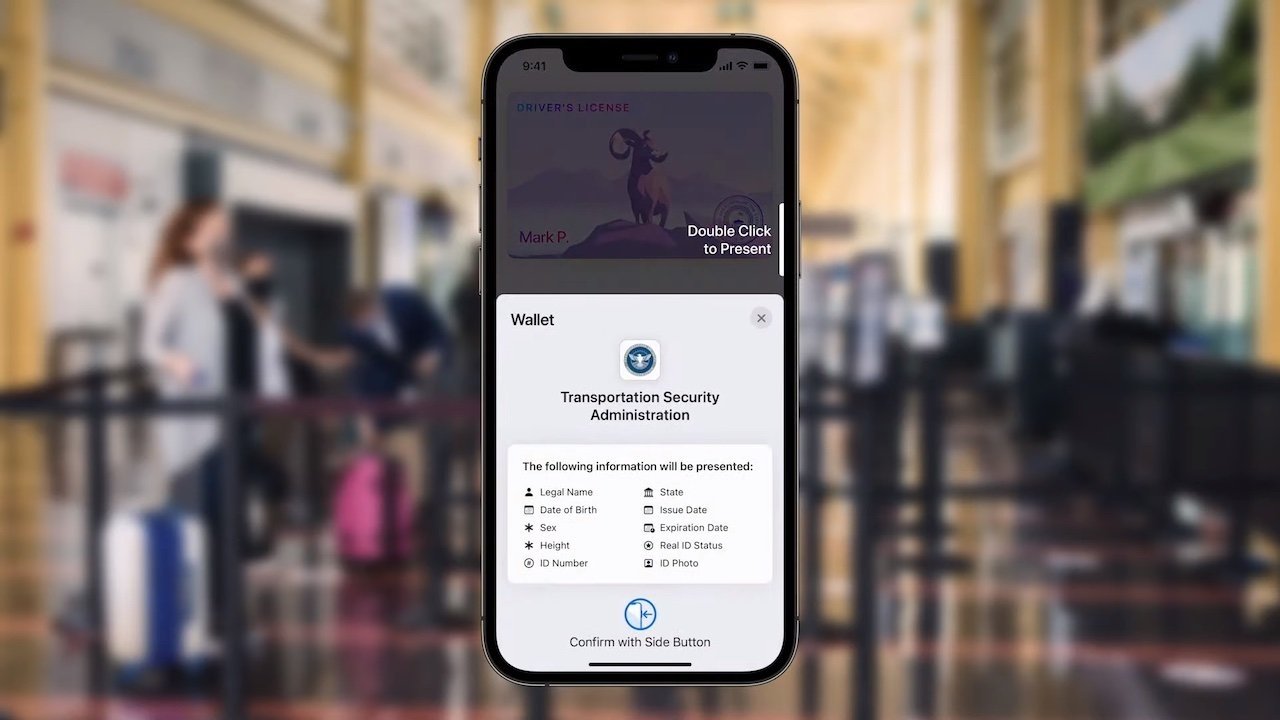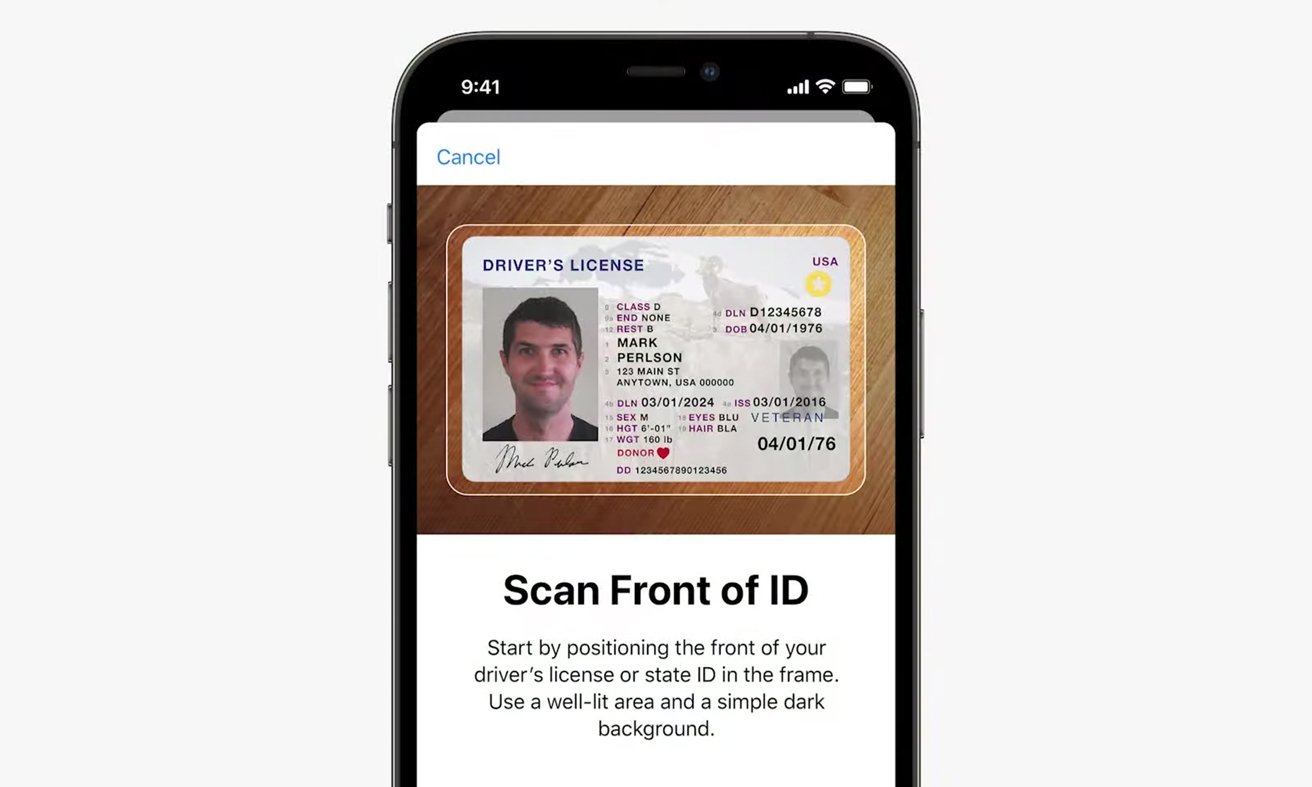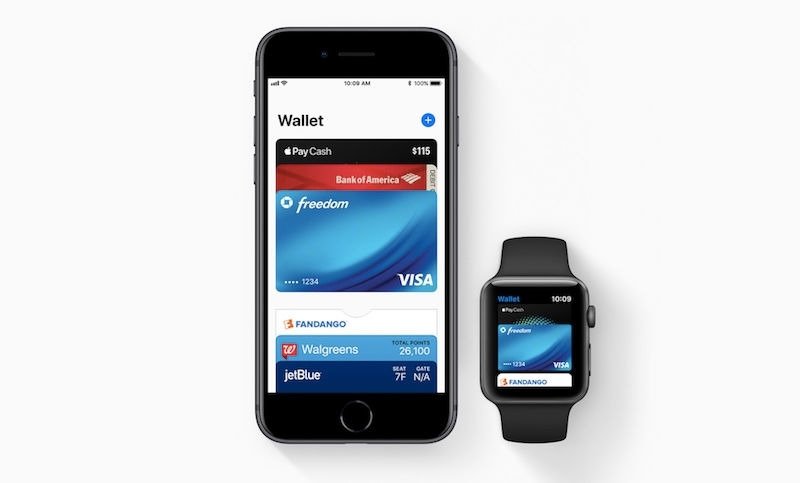USA's 2023 Real ID air travel requirement could benefit from Apple's iOS 15 digital driver...
Repeatedly delayed, the U.S. Department of Homeland Security's Real ID enforcement, which will require more secure identification credentials for domestic air travel by May 2023, could see even stronger uptake once Apple launches digital driver's licenses in its upcoming iOS 15 update.

The DHS Real ID program will require every domestic airline passenger ages 18 and older to carry with them a compliant, secure license identification card, if they do not have a U.S. passport.
In other words, American citizens will no longer be able to take flights within the U.S. with just a basic state-issued driver's license -- they'll need to have a newly enhanced Real ID card, which is now being offered by all 50 U.S. states, the District of Columbia, and four of five U.S. territories.
DHS intended to make Real ID the law of the land years ago, but has repeatedly delayed enforcement to give both states and citizens more time. Because Real ID cards are more secure, citizens are required to provide more proof of identification when obtaining a new license or identification card -- something that was made even more challenging by the onset of Covid and closure of many state offices.
Most recently, in April, DHS delayed enforcement of Real ID from Oct. 1, 2021 to May 3, 2023, citing the ongoing pandemic.
As part of the announcement, Apple revealed that it has partnered with the U.S. Transportation Security Administration, which is part of the DHS, to ensure that its digital ID system will be compliant with new domestic travel requirements.
Accordingly, a screenshot of the digital ID shown at WWDC clearly spells out that "Real ID Status" will be included on the virtual card.

Details from Apple on the new digital ID were relatively light -- the feature won't even launch alongside iOS 15, and is only promised to debut before the end of the year. Apple also hasn't disclosed which U.S. states will support the feature at launch.
However, the combination of receiving the endorsement of the TSA, plus the fact that many U.S. citizens will need to get a new ID card in order to travel within the country in the next few years, could drive a perfect storm of adoption for digital identification.
Upon last week's announcement, NPR quoted privacy experts who raised hypothetical concerns that seem unrealistic to anyone who knows how Apple operates. One critic suggested Apple could one day require transaction fees to use a digital ID, while another said it could be a way for the iPhone maker to track users -- neither of which is congruent with the company's established business practices.

For its part, Apple has revealed that presenting an ID card will work the same as Apple Pay, requiring secure authentication with Face ID or Touch ID. The new system will also use the same Secure Enclave leveraged by Apple Pay, which significantly reduces the chance of fraud.
It's that very same security that led credit card companies to quickly embrace Apple Pay at launch. Apple Pay uses a tokenization system that randomly generates a credit card number and transmits it wirelessly over NFC.
By never sharing the user's actual credit card number, the risk of fraud is reduced to essentially zero.
It's easy to see why the TSA sees the same kinds of security advantages with a digital ID. It also seems likely that many states could reach the same conclusion, and rapidly embrace digital driver's licenses as ID card requirements become more stringent.
Though culturally the U.S. is accustomed to physical identification cards, the flaws in the current system are numerous -- anyone who was a teenager in the U.S. knows someone who had a fake or "borrowed" driver's license that they could us to buy alcohol or tobacco products.
By connecting a secure, authenticated digital ID card to a biometric security system like Touch ID or Face ID, the opportunities to use false identification for anything -- whether it be domestic travel, or just attempting to buy a 12-pack of Miller Lite -- will become that much more difficult.

It's a win for Apple, which further drives adoption of its digital Wallet; it's a win for DHS and the TSA, which strive to make airline travel as safe as possible; and it's a win for states, which are responsible for issuing driver's licenses.
Of course, there will be skeptics who would rather not adopt a digital ID card, as there should be. And for them, physical driver's licenses and other accepted forms of identification will remain.
But for those willing to embrace enhanced security -- with the added benefit of having to carry one less physical card, or to ditch your wallet entirely -- the new option of digital identification will be welcomed.

The DHS Real ID program will require every domestic airline passenger ages 18 and older to carry with them a compliant, secure license identification card, if they do not have a U.S. passport.
In other words, American citizens will no longer be able to take flights within the U.S. with just a basic state-issued driver's license -- they'll need to have a newly enhanced Real ID card, which is now being offered by all 50 U.S. states, the District of Columbia, and four of five U.S. territories.
DHS intended to make Real ID the law of the land years ago, but has repeatedly delayed enforcement to give both states and citizens more time. Because Real ID cards are more secure, citizens are required to provide more proof of identification when obtaining a new license or identification card -- something that was made even more challenging by the onset of Covid and closure of many state offices.
Most recently, in April, DHS delayed enforcement of Real ID from Oct. 1, 2021 to May 3, 2023, citing the ongoing pandemic.
Right time, right place, right partner
These secure requirements and delays present a unique opportunity for Apple, which last week at its annual Worldwide Developers Conference announced that it will later this year introduce digital driver's licenses that can be used to securely identify a person from their iPhone or Apple Watch.As part of the announcement, Apple revealed that it has partnered with the U.S. Transportation Security Administration, which is part of the DHS, to ensure that its digital ID system will be compliant with new domestic travel requirements.
Accordingly, a screenshot of the digital ID shown at WWDC clearly spells out that "Real ID Status" will be included on the virtual card.

Details from Apple on the new digital ID were relatively light -- the feature won't even launch alongside iOS 15, and is only promised to debut before the end of the year. Apple also hasn't disclosed which U.S. states will support the feature at launch.
However, the combination of receiving the endorsement of the TSA, plus the fact that many U.S. citizens will need to get a new ID card in order to travel within the country in the next few years, could drive a perfect storm of adoption for digital identification.
Security concerns remain hypothetical
As with any time new technology is introduced -- particularly when it replaces something physical and analog -- there is always some pushback and, frankly, paranoia.Upon last week's announcement, NPR quoted privacy experts who raised hypothetical concerns that seem unrealistic to anyone who knows how Apple operates. One critic suggested Apple could one day require transaction fees to use a digital ID, while another said it could be a way for the iPhone maker to track users -- neither of which is congruent with the company's established business practices.

For its part, Apple has revealed that presenting an ID card will work the same as Apple Pay, requiring secure authentication with Face ID or Touch ID. The new system will also use the same Secure Enclave leveraged by Apple Pay, which significantly reduces the chance of fraud.
It's that very same security that led credit card companies to quickly embrace Apple Pay at launch. Apple Pay uses a tokenization system that randomly generates a credit card number and transmits it wirelessly over NFC.
By never sharing the user's actual credit card number, the risk of fraud is reduced to essentially zero.
It's easy to see why the TSA sees the same kinds of security advantages with a digital ID. It also seems likely that many states could reach the same conclusion, and rapidly embrace digital driver's licenses as ID card requirements become more stringent.
Though culturally the U.S. is accustomed to physical identification cards, the flaws in the current system are numerous -- anyone who was a teenager in the U.S. knows someone who had a fake or "borrowed" driver's license that they could us to buy alcohol or tobacco products.
By connecting a secure, authenticated digital ID card to a biometric security system like Touch ID or Face ID, the opportunities to use false identification for anything -- whether it be domestic travel, or just attempting to buy a 12-pack of Miller Lite -- will become that much more difficult.

It's a win for Apple, which further drives adoption of its digital Wallet; it's a win for DHS and the TSA, which strive to make airline travel as safe as possible; and it's a win for states, which are responsible for issuing driver's licenses.
Of course, there will be skeptics who would rather not adopt a digital ID card, as there should be. And for them, physical driver's licenses and other accepted forms of identification will remain.
But for those willing to embrace enhanced security -- with the added benefit of having to carry one less physical card, or to ditch your wallet entirely -- the new option of digital identification will be welcomed.

Comments
As for digital ID cards, I look forward to more information about how they work. Hopefully it's something like the emergency medical ID. Showing it should disable the Lightning port and lock the phone such that the passcode is required to unlock it. The screen showing what will be presented suggests it might actually be sent electronically for viewing on a device which is not your phone. Would cops, bouncers, grocery store clerks, and so on have to carry around a separate device capable of receiving and verifying information? That would seem to be quite a high requirement for a lot of places.
Now the California DMV won’t give me a “Real ID” until I go through the courts to formally change my second middle name to my first name to the tune of $500 - even though it shows my name on the birth certificate (as a second middle name) and have been using it as my first name for more than 50 years. I don’t plan to ever fly again (I’m 74 and live in a Paradise called Santa Cruz CA). So I’m not going to spend $500 for something I’ll never use. Bureaucrats.
Hope this won’t keep me from being able to use Apple’s Wallet from storing my Unreal driver’s license.
It does not serve the purpose it purports to because it’s not actually secure. As mentioned by others, the documents required to get it are easily forgeable. Like software copy protection schemes, it only hurts honest people.
It turns out that I do not have my birth certificate. My parents thought we did because none of us knew that the thing the hospital gives parents is a piece of garbage no better than a gift shop keepsake.
I was born in the USA. So were both my parents before me, but I can’t get this bulshitty “RealID” and prove I’m a legitimate American without jumping through various idiotic hoops. Some of those hoops are literal catch-22 scenarios. I started trying to get it, and I gave up... as the people who installed this BS intended.
Aside from acting as a voter suppression effort, it’s just security theatre. Like the TSA.
Between the ID nonsense and the authoritarianism & abuse of the TSA, I don’t ever fly. My girlfriend lives in California. That’s literally the opposite side of the continent from me. She wants me to visit her there some day so that it’s not just her coming to see me. I understand that want. However, If I don’t manage to fly there and back before the BS “Real ID” requirement, I don’t know how I’m going to manage it. Redouble my efforts to jump through the damned flaming hoops, I guess. All this effort just to subject myself to the police state BS of the TSA... it’s not motivating.
Luckily, the effort to require “RealID” for voting was struck down in my state.
It may be a while before I ever get in an airplane again (now more because of psychotic fellow passengers and insanely inadequate legroom than COVID fears), but I've been to enough one-gate airports to know that the screener/checkin clerk.baggage handler is going to say, "Uh uh. You have to show me your real license, not a picture." If TSA approves the use of this, it should work at major hubs, but smaller airports may be an issue.
Based on my experiences, I would estimate that 5% of all people have at least one ID with a wrong name issued. And people never think of that as a positive thing, but it is if you want the government to be confused about your identity. Some people would love to have no IDs at all from any level of government. A conflicting ID might get you out of a speeding ticket, because the name on the ticket might not be an exact match with one of your other IDs. But I'm not a lawyer.
People think that the government is one monolithic entity with a single database containing people's data, including their names. In fact it's a complex assembly of databases each one of which may contain an error for any specific person. These different departments, especially between federal and state governments, don't share data readily, and certainly don't validate and correct each others' data. I believe there are some laws which require separate databases for different departments. RealID is another potential mismatch. Everyone who hates being tracked by their government should be eager to try to get one of their "wrong names" onto their RealID. And then you can show your misspelled ID to all your close friends for a great laugh. I once met someone who had three digits in one of his names, on an unimportant ID, and he sent an email to request a correction, and I tried to stop him, "Don't do that! You're the only person in the world with a digit in your name!" He tried to cancel the request, but it was too late; it got fixed.
Anyhow, DHS/TSA is definitely the means to prod meaningful adoption.
Personally, I’d like to see the US Code (where the REAL ID requirements are set) amended such that there’s a requirement for any data, transmitted for the purpose of validation of an ID, to be deleted within 24 hours. I also think the Code should mandate that a digital ID is only REAL ID compliant if it can be presented without device unlock.
I formerly had a colleague who used to work at a high school, and one of the students would "borrow" his ID when trying to get alcohol or access to venues where it was served. My colleague was always bemused that it worked - the two of them looked nothing alike other than having red hair.